

WeAreGifted2. Unwrapping the Gifted. A global network of parents and educators interested in identifying and nurturing every child’s gifts. Parenting Gifted Kids. Specializing in Social & Emotional Needs of Gifted Children. Living the Life Fantastic - Helping Children Make Peace with Anxiety. Laughing at Chaos - Where Wildly Different Is Perfectly Normal. Creative people. Gifted Parenting Support.
Gifted Guru - Resources, Ideas and Tips for Educators & Parents of the Gifted. Gifted Exchange. Gifted Education Perspectives. Our gifted children—parenting, education, support and advocacy. Gifted (2016) FULL "movie Online`free. ECHA-Diplom. Schülerinnen und Schüler mit besonderen Begabungen stellen eine große Herausforderung für Lehrpersonen in der schulischen Praxis dar.
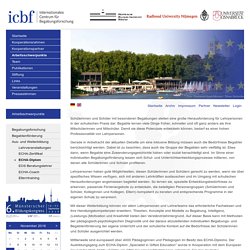
Begabte lernen viele Dinge früher, schneller und oft ganz anders als ihre Mitschülerinnen und Mitschüler. Damit sie diese Potenziale entwickeln können, bedarf es einer hohen Professionalität von Lehrpersonen. Gerade in Anbetracht der aktuellen Debatte um eine inklusive Bildung müssen auch die Bedürfnisse Begabter berücksichtigt werden. Dabei ist zu beachten, dass auch die Gruppe der Begabten sehr vielfältig ist.
Etwa dann, wenn Begabte eine Zuwanderungsgeschichte haben oder sozial benachteiligt sind. Lehrpersonen haben gute Möglichkeiten, diesen Schülerinnen und Schülern gerecht zu werden, wenn sie über spezifisches Wissen verfügen, sich mit anderen Lehrkräften austauschen und im Umgang mit schulischen Herausforderungen angemessen begleitet werden. Mittlerweile sind europaweit über 4000 Pädagoginnen und Pädagogen im Besitz des ECHA-Diploms. 1. 1. Klausur. National Association for Gifted Children. Children who complete tasks identified as gifted.
Children who are able to complete tasks at the start of kindergarten are more likely to be enrolled in a gifted program in 3rd grade, says a recent study of 889 kindergartners published in Psychology in the Schools.
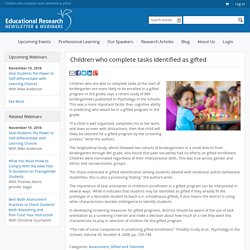
This was a more important factor than cognitive ability in predicting who would be in a gifted program in 3rd grade. “If a child is well organized, completes his or her work, and does so even with distractions, then that child will likely be selected for a gifted program by the screening process,” write the authors. The longitudinal study, which followed two cohorts of kindergartners in a small district from kindergarten through 8th grade, also found that peer sociability had no effects on gifted enrollment. Children were nominated regardless of their interpersonal skills. This was true across gender and ethnic and socioeconomic groups. Except able glines. Gifted & Talented.
International Handbook on Giftedness. National Association for Gifted Children. Giftedness, intelligence, and talent are fluid concepts and may look different in different contexts and cultures.
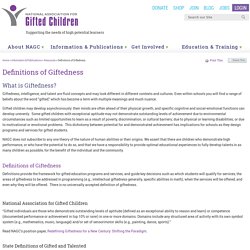
Even within schools you will find a range of beliefs about the word "gifted," which has become a term with multiple meanings and much nuance. Gifted children may develop asynchronously: their minds are often ahead of their physical growth, and specific cognitive and social-emotional functions can develop unevenly. Some gifted children with exceptional aptitude may not demonstrate outstanding levels of achievement due to environmental circumstances such as limited opportunities to learn as a result of poverty, discrimination, or cultural barriers; due to physical or learning disabilities; or due to motivational or emotional problems. National Association for Gifted Children. Characteristics and Behaviors of the Gifted. Characteristics of Gifted Children Identifying The Gifted Recognizing the Characteristics of Gifted Children General Behavior Characteristics Learning Characteristics Creative Characteristics.
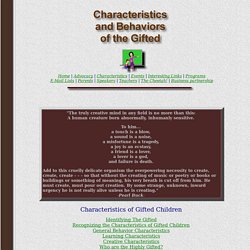
Home - Jade Rivera. Choosing the Right Program for Gifted Children - SENG. Choosing the Right Program for Gifted Children I can truly say, as a school psychologist, I have rarely witnessed a negative reaction from parents when they are informed their child meets eligibility for Gifted programming.
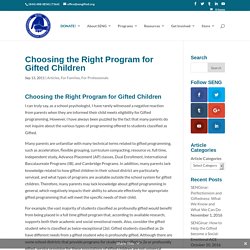
However, I have always been puzzled by the fact that many parents do not inquire about the various types of programming offered to students classified as Gifted. Many parents are unfamiliar with many technical terms related to gifted programming, such as acceleration, flexible grouping, curriculum compacting, resource vs. full time, independent study, Advance Placement (AP) classes, Dual Enrollment, International Baccalaureate Programs (IB), and Cambridge Programs.
Working with Gifted & Talented Students - TeachersFirst. Working with a gifted student can be both a joy and a frustration.

To understand why, we need to be clear about definitions. A gifted student is one whose intelligence - typically described as an IQ score resulting from one or more tests - is 130 or above. That is, giftedness is a measure of innate ability, not performance. The result is a paradox. Howard Gardner of The Multiple Intelligence Theory. Howard Gardner, multiple intelligences and education. Howard Gardner, multiple intelligences and education.
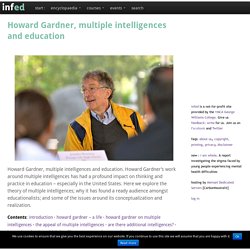
Howard Gardner’s work around multiple intelligences has had a profound impact on thinking and practice in education – especially in the United States. Here we explore the theory of multiple intelligences; why it has found a ready audience amongst educationalists; and some of the issues around its conceptualization and realization. Contents: introduction · howard gardner – a life · howard gardner on multiple intelligences · the appeal of multiple intelligences · are there additional intelligences? · howard gardner’s multiple intelligences – some issues and problems · conclusion · further reading and references · how to cite this article I want my children to understand the world, but not just because the world is fascinating and the human mind is curious.
Howard Earl Gardner’s (1943- ) work has been marked by a desire not to just describe the world but to help to create the conditions to change it. Tips for Teachers: Successful strategies for teaching gifted learners. Howard Gardner: Five Minds for the Future - Full Lecture. The Nine Different Types of Intelligence. Intelligence is broken down into nine different types, also called the nine domains of intelligence.

This categorization of intelligence was first theorized by developmental psychologist Howard Gardner in his 1983 book, Frames of Mind: The Theory of Multiple Intelligences. Since then, the Multiple Intelligences theory been used as one of the primary models for research that has gone on concerning human cognition. Gardner argues that there is no one true way to measure intelligence and that the human brain is wired with a wide range of cognitive abilities. Framing intelligence in the way Gardner does disrupts the old mold of thinking in which intelligence was ultimately a measure of (what Gardner would call) logical-mathematical intelligence. 1. Ever wonder why certain people are able to connect with animals just like that? 2. While other people gravitate towards nature, there are also those who tend to be drawn to the musical arts. Read about how music changes your brain 3. 4. 5. 6. 7. Gifted and Talented Programs in Schools: The Pros and Cons by Courtney O'Brien on Prezi.
Uniquely Gifted - Resources for Gifted/Special Needs Children. A Brief Look at America's Gifted Students. The United States has a gifted and talented student problem: Mainly, too few of the nation’s students score high on domestic and international assessments, and those that do are disproportionately well-off, Asian-American or white.
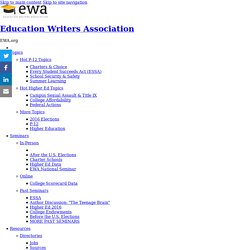
Emmanuel Felton of The Hechinger Report has a new story on how one school system in Louisiana is trying to address both of these facts by raising the number of black and Latino students who are enrolled in gifted programs, thereby adding to America’s relatively small number of accelerated learners. Felton’s piece is a must-read, as it synthesizes a lot of data and on-the-ground reporting to tell a nuanced tale of gifted instruction in the United States. I’ll offer my own reporting to complement his stellar work. Compared to other wealthy countries, a much smaller percentage of U.S. 15-year-olds show a mastery of math; more students in gifted courses could improve America’s standing internationally in this arena. In 2012, when the U.S. Gifted Development Center. National Association for Gifted Children. International Partners - ÖZBF. Alpha? Take the Tour: What Is Wolfram. TED. Management Training and Leadership Training - Online.
Gifted dexperts - Recherche Google. Who Are The 'Gifted And Talented' And What Do They Need? : NPR Ed. Ron Turiello's daughter, Grace, seemed unusually alert even as a newborn.
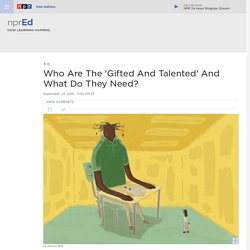
At 7 months or so, she showed an interest in categorizing objects: She'd take a drawing of an elephant in a picture book, say, and match it to a stuffed elephant and a realistic plastic elephant. At 5 or 6 years old, when snorkeling with her family in Hawaii, she identified a passing fish correctly as a Heller's barracuda, then added, "Where are the rest? They usually travel in schools. " With a child so bright, some parents might assume that she'd do great in any school setting, and pretty much leave it at that.
But Turiello was convinced she needed a special environment, in part because of his own experience. "I took a swing at the teacher in second grade because she was making fun of my vocabulary," he recalls. Emotional Intelligence. Oxbridge gifted and talented course launches at NCC. Exceptional students have earned themselves a place on an exciting course to help them through the competitive process of applying for the country’s top universities. The Oxbridge gifted and talented programme has officially launched at Nelson and Colne College, with a presentation from the University of Oxford’s Schools Liaison and Outreach Officer Harriet Rudden and a series of engaging workshops about the admissions process. Thirty-two students, who were nominated by their teachers, were in attendance at the event, where they were told more about the benefits of the programme.
These include: Receiving mentoring from members of the Nelson and Colne College management teamAttending a residential visit to either Oxford or CambridgeReceiving advice and guidance on the complex application process to top universities and to competitive courses such as Medicine, Dentistry, Law and Veterinary Science. What Is My Learning Style - Global Thinker. Global thinking style - Google Scholar.
Lateral Thinking - The toolset of Creativity and Innovation. Twiceexceptional. Welcome to 2e Newsletter! The-quad-manhattan. Giftedness - Google Scholar. Gifted Homeschoolers Forum. Gifted education - Wikipedia. Gifted education (also known as Gifted and Talented Education (GATE), Talented and Gifted (TAG), or G/T) is a broad term for special practices, procedures, and theories used in the education of children who have been identified as gifted or talented. The main approaches to gifted education are enrichment and acceleration.
An enrichment program teaches additional, related material, but keeps the student progressing through the curriculum at the same rate. For example, after the gifted students have completed the normal work in the curriculum, an enrichment program might provide them with additional details about a subject in the curriculum. An acceleration program advances the student through the standard curriculum faster than normal. When gifted students have completed the normal work, they move on to the next subject in the curriculum, even though the rest of the class is still working on the first subject. Is your child gifted? At a glance About 10 per cent of the Australian population is gifted or significantly advanced in a specific area. Kids can be gifted intellectually, creatively, socially or physically.
AAEGT is the National Association representing the interests of gifted children. Hochbegabung bei Kindern — DGhK. Hochbegabte Kinder fallen auf Besonders begabte Kinder sind in manchem anders als ihre Altersgenossen. Das kann - muss aber nicht - zu Schwierigkeiten führen. Manchmal ist allerdings leider erst das Auftreten von Auffälligkeiten der Ausgangspunkt für das Erkennen einer Hochbegabung. Im Kindergarten fällt das Kind auf, weil es sich langweiltweil es manche Spiele "doof" findet und deshalb stört, um wahrgenommen zu werdenweil es sich für Dinge interessiert, für die es andere für "zu jung" haltenweil es sich in die Gruppe nicht einbringen kann und damit häufig zum Außenseiter wird. In der Schule fällt das Kind auf, Internationales Centrum für Begabungsforschung (ICBF) Kurzbeschreibung Das ICBF ist eine Kooperationseinrichtung der Westfälischen Wilhelms-Universität Münster und der Radboud Universiteit Nijmegen.
Arbeitsschwerpunkte. Das ICBF hat folgende Arbeitsschwerpunkte: Begabungsforschung Erforschung von Entwicklungsbedingungen besonderer Begabungen sowie Implementierung und Evaluation von Diagnoseinstrumenten, Beratungsansätzen und Förderkonzepten für besonders begabte Kinder, Jugendliche und Erwachsene Begabtenförderung Diagnostik und Förderung von Begabung, Lernkompetenz und Persönlichkeitsentwicklung bei besonders begabten Kindern, Jugendlichen und Erwachsenen sowie Beratung von Eltern, Erzieherinnen und Erziehern und Lehrerinnen und Lehrern im unterrichtlichen und außerunterrichtlichen Kontext. El 198404 reis. Gifted Challenges: Top blogs about gifted children, gifted education, and parenting.
There are so many great blogs about gifted children, adolescents and adults, each of which provide a somewhat different perspective. These blogs are written by teachers, parents, therapists, and researchers. They describe parenting dilemmas, personal triumphs and struggles, and research-based strategies that work. While there are also many wonderful websites, books, and blogsites specifically geared toward gifted education strategies, the blogs listed below were selected because of their focus on the social and emotional aspects of giftedness, parenting dilemmas, or advocacy. Gifted school programs - pros and cons? - Gifted Issues Discussion Forum. Hi ChelseaMom, Welcome! Top-Ten-Ways-To-Annoy-A-Gifted-Child. Oh, help!
How reading this brought back memories… BAD memories! I was subject to many, if not all, of these strategies whilst at school. I’ve no idea whether I’d consider myself “gifted” (something of my inherent distaste towards vanity tells me not to adopt that title), but I was certainly WELL AHEAD of my peers academically. I started school a year early (aged 3), and was already reading and writing and undertaking arithmetic well before this age. I think this had a lot to do with my mother, who was a firm believer in trying to engage my interest in learning from an early age, and who was happy for me to show interest in as wide a range of subjects as I liked. Unfortunately, the school that I attended seemed to think that children had to “be with their peers”, the result being that I was held back a year, to allow my own age group to “catch up”. This enforced extra year was SHEER TORMENT. Far too many assumptions are made about highly academic children. Stanford EPGY - Education Program for Gifted Youth.